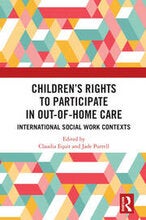
This page contains documents and other resources related to children's care in Europe. Browse resources by region, country, or category.
This page contains documents and other resources related to children's care in Europe. Browse resources by region, country, or category.
Displaying 421 - 430 of 3483
Olena Merzliakova, a psychologist and Ph.D. in Psychology, shared effective and simple tips for parents. She is one of the experts engaged for the EU-funded hotline established this summer by the UNDP.
No part of Scotland was “immune” to abuse of children in foster care over more than eight decades, an inquiry has heard. The Scottish Child Abuse Inquiry (SCAI) has been told of physical, sexual, psychological and emotional abuse, neglect and exploitation since public hearings for the foster care case study opened in May.
This report presents the findings of an online survey and individual interviews which explored the experiences of carers providing out-of-home care to infants in New South Wales. While there is increasing research related to the care of children and young people requiring out-of-home Care, there is comparatively less specifically related to the care of infants. The findings highlight a need to provide increased training, support, and resources for new carers of infants in out-of-home care.
This is the third report by Coram Voice and The Rees Centre at University of Oxford exploring learning from the Your Life, Your Care surveys that are part of the Bright Spots Programme. It is an analysis of 9,472 responses from children and young people (aged 4-18 years) collected between 2016 and 2021 from 38 Local Authorities in England. The findings build on previous overview reports and the pilot stage in 2015 that involved 611 children and young people. By 2021, the research team had gathered over 10,000 voices from children in care in England.
These are the key findings and recommendations of a report produced by Coram Voice and The Rees Centre at University of Oxford that captures the views of 10,000 children and young people in care in the UK on their wellbeing. This report summarises responses collected through the largest survey of its kind from children and young people aged 4-18 years between 2016 and 2021, giving unprecedented insight into children in care’s subjective wellbeing.
This report produced by Coram Voice and the NYAS (National Youth Advocacy Service) captures the views of care-experienced children and young people in the UK on recommendations set out in the independent review of children’s social care in England.
Eighty-seven per cent of the Ukrainian refugees to whom Bulgaria has granted temporary protection are women and children, the UN High Commission for Refugees (UNHCR) representation said in an operational update for Bulgaria, released on November 30.
Russia is set to approve legislation prohibiting foreigners from hiring Russian women to be surrogate mothers for them, the top lawmaker of the Russian State Duma announced Sunday, the country's Mother's Day.
This volume covers a broad spectrum of current research findings concerning the participation of young people in foster families and residential living groups in Australia, Canada, Germany, Ireland, Italy, Portugal, Norway, Sweden, and Switzerland as well as cross-nationals perspective on children and young people’s participation in foster and residential care placements in Great Britain and France.

Russia will soon adopt a law barring foreigners from using Russian surrogate mothers, Vyacheslav Volodin, the speaker of the lower house of parliament said on Sunday, the nation's Mother's Day. Paid surrogacy is legal in Russia, but the practice has been criticised by religious groups as commercializing the birth of children.